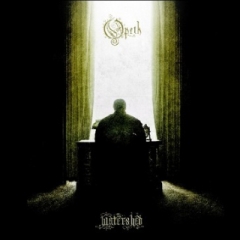Opeth - Watershed (2008)
Opeth - Watershed (2008)

1 Coil 3:11 2 Heir Apparent 8:50 3 The Lotus Eater 8:51 4 Burden 7:41 5 Porcelain Heart 8:01 6 Hessian Peel 11:26 7 Hex Omega 7:01 Bass – Martin Mendez Drums, Percussion – Martin Axenrot Guitar – Fredrik Åkesson Guitar, Vocals – Mikael Åkerfeldt Keyboards – Per Wiberg Vocals [Guest] – Natalie Lorichs (tracks: 1)
It took me almost eight years to appreciate this album and I never really tried to like it in the first place.
So one day I decided to give the less-listened and live Opeth albums a go. The results of this re-listening varied but two things happened: the live albums made me realize how great some of their songs are and the Royal Albert hall concert made me realize that Mikael is a great comedian. Then I listened to “Watershed” and lo and behold! It was still as absurdly disjointed as ever but with a degree of un-seriousness I found myself enjoying it a lot. I can’t imagine anyone saying “Man, it’s cool!” hearing the descending tone break, the funk part, or the, khem, coda of “The Lotus Eater”, but hey! why not actually allow the guys some fun playing this oh-so-serious music?
Apart from the convoluted song structures there is not much to criticize here. All the prog influenced parts (“Coil”, “Burden”, different parts here and there, the mellotron, the vibraphone) are really well-done and convincing (unlike “Heritage”); the heavy parts kick massive ass (“Heir Apparent” is fucking brilliant); the blast beats + clean vocals part in “The Lotus Eater” is one of those genius-level ideas that lift an album one notch higher.
Of course, as much as I came to enjoy the unwieldy character of the album, it would benefit from some trimming and common sense, but then it would probably lose some of its charm too. As it is, “Watershed” has the unique position in Opeth’s discography of a, well, watershed album before they turned full-on progressive but still played harder than ever. I also have to admit that although my opinion is that the band have still not realized their potential as a prog unit (“Damnation” was the closest), quite the opposite, had they continued in this direction, it might well have been unbearably disjointed. Hell, “Heritage” is a jumbled mess as it is, I don’t even want to imagine it with metal elements thrown in!
The bottomline is: I used to find this album the epitome of Opeth’s excess and it felt unbearably long. Now I am surprised by how short it is and how much good music it packs. An excellent, flawed album. ---bimu, metal-archives.com
Początek tego albumu jest bardziej szokujący niż cały "Damnation". "Coil" to spokojna, akustyczna piosenka, o nieco folkowym klimacie. W pierwszej połowie śpiewa Åkerfeldt, a dalej... folkowa wokalistka Nathalie Lorichs (znana także ze współpracy z Jonem Lordem). Nie lubię damsko-męskich duetów, ale tutaj wyszło całkiem ciekawie. Cały klimat pryska wraz z "Heir Apparent" - zdecydowanie zbyt brutalnym, pomimo kilku charakterystycznych dla grupy łagodniejszych przejść. Lepiej wypada "The Lotus Eater", w którym growle są równoważone czystym śpiewem. Pojawia się tutaj też dużo odjechanych dźwięków klawiszowych. Po tym utworze album uspokaja się. Najlepszy (i jeden z najlepszych w całej dyskografii) na płycie "Burden" to piękna ballada, przywołująca klimat muzyki z lat 70-ych. Słychać tu i Deep Purple (Hammondy, melodia), i King Crimson (melotronowe tło), i Pink Floyd (długie gitarowe solówki). Szkoda tylko, że całość psuje żartobliwa końcówka grana na coraz bardziej niestrojącym akustyku.
Ostatnie trzy utwory zbudowane są na podobnej zasadzie - spokojne fragmenty, oparte na gitarach akustycznych i brzmieniach klawiszowo-symfonicznych, zestawiono z ciężkimi, stricte metalowymi (ale tylko w "Hessian Peel" pojawia się growling). Dwa ostatnie są mocno nużące, nieco lepiej jest w "Porcelain Heart", który jednak tle wcześniejszych utworów grupy utrzymanych w tym stylu, wypada blado. Zespół nagrał go także w spokojniejszej wersji o wszystko mówiącym tytule "Mellotron Heart". Obie wersje zostały wydane na osobnych singlach, tą drugą można było znaleźć na dodatkowym dysku promocyjnej wersji "Watershed". Longplay został wydany także w edycji specjalnej, z trzema innymi bonusami: autorskim "Derelict Herds" (bardzo udanym zresztą, niezrozumiały jest jego brak w edycji podstawowej), oraz interesującymi przeróbkami bluesrockowego "Bridge of Sighs" Robina Trowera i akustycznego "Den ständiga resan" z repertuaru wokalistki Roxette, Marie Fredriksson, w którym Åkerfeldt po raz pierwszy śpiewa w swoim ojczystym, szwedzkim języku. Szkoda, że zabrakło miejsca dla świetnej interpretacji "Would?" Alice in Chains, która trafiła na stronę B singla "Burden".
W chwili wydania "Watershed" wydawał się kolejnym eksperymentalnym longplayem w dorobku grupy. Z dzisiejszej perspektywy czasu nie jest już tak zaskakujący - to po prostu album przejściowy, pomiędzy "dawnym" Opeth, a tym z wydanego trzy lata później "Heritage". ---Paweł Pałasz, pablosreviews.blogspot.com
download (mp3 @320 kbs):
Zmieniony (Czwartek, 04 Październik 2018 21:55)








